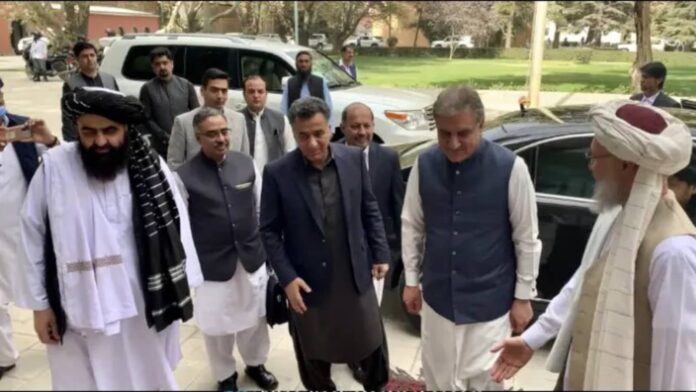| Translate This News In |
|---|
Even if Pakistan and China are attempting to depict India as anti-Taliban by not attending the Afghanistan meeting on Wednesday, the real goal is to stabilise strife-torn Kabul so that rising Islamic extremism does not morph into global terrorism and harm the region and beyond. The Indian National Security Council Secretariat (NSCS), led by National Security Advisor Ajit Doval, is hosting the Afghanistan meeting.
Moeed Yusuf, Pakistan’s national security adviser, has publicly referred to India as a spoiler in Afghanistan and has opted not to attend the meeting. China, which has backed Pakistan’s overt and covert involvement in Afghanistan, has not said if it will attend the summit. Russia is represented at the summit, with delegates from Iran, Kyrgyzstan, Turkmenistan, Kazakhstan, Uzbekistan, and Tajikistan. Nikolai Patrushev, Secretary of the Russian Security Council and President Putin’s right-hand man, is leading the mission.
The goal of the conference, according to organisers, is not to rekindle any opposition to the Taliban administration, but to stabilise Afghanistan, where the so-called Islamic State of Khorasan Province (ISKP) is inflicting havoc on Shias and other non-Sunni minorities and Al Qaeda is resurgent. The most serious concern about unstable Afghanistan, which is influenced by Pakistan’s deep state, is that the drought-prone lawless country may devolve into absolute chaos and become a global jihad hotspot. On both sides of the Durand Line, while Russia is concerned about the security danger to Central Asian republics, Iran is concerned about increased Pakistani intervention and Shia persecution. The increasing radicalization in the Indian subcontinent has New Delhi concerned.
No country has recognised the Sunni Pashtun group, whose sword arm is the Pakistani ISI-backed Haqqani network, nearly three months after the Taliban captured Kabul (HQN). With Mullah Yaqoob’s group at war with Sirajuddin Haqqani, the HQN’s leader, there is little government in Kabul, and all of the Taliban’s promises made as part of the Doha agreement have been thrown into the Kabul River. The ultra-conservative zealots roving the country with state-of-the-art US armament are launching violent attacks on minorities, particularly women.
Even Pakistan Army Chief Gen Qamar Javed Bajwa is concerned about terrorist ideology spilling over the Durand Line and posing a threat to Islamabad. The Pakistan Army clearly disagrees with Prime Minister Imran Khan’s civilian leadership, which believes that Islamist forces in Afghanistan will serve Islamabad’s political goals against India and provide much-needed economic leverage from the West. The power struggle in Pakistan could emerge either before or after the appointment of new DG ISI Lt Gen Nadeem Anjum on November 20.
China, Pakistan’s main backer, is directly and indirectly engaging the Taliban rule through Islamabad to ensure that terrorist groups in Afghanistan do not join forces with Uighur terrorist groups to attack Xi Jinping’s authority in the adjacent Xinjiang province via the Wakhan corridor. Another motive for Taliban cooperation is to promote the Belt Road Initiative in Afghanistan and, more crucially, to guarantee that CPEC projects are not targeted by related Sunni Deobandi groups such as Pakistan’s Tehreek-e-Taliban. Given the influence of the ISI on a segment of the Taliban administration in Kabul, China is influenced by Pakistan’s policy on Afghanistan in this context.
India may be irritated by the ISI’s influence in Kabul, but its primary interest is Afghanistan’s stability, even with the Taliban in charge of the government. An unstable Kabul will not only signal doom for the Indian subcontinent, but also for the rest of the world, as the Af-Pak region will once again create a huge number of terrorists.


















